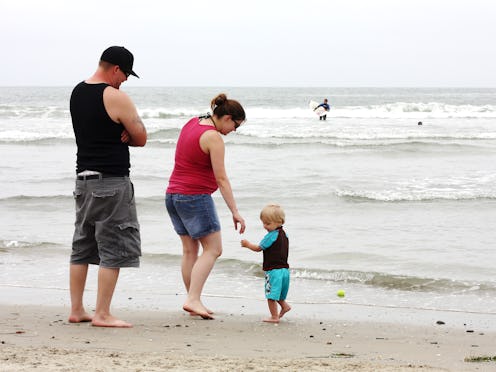News
Does Having A Baby Before Marriage Spell Divorce?

In the past, studies have consistently found that couples who have a child before getting married were much more likely to divorce than couples who married first. But now that the practice has become increasingly common, the Council on Contemporary Families thought it was as good a time as any to look at those numbers again. And yep, it turns out that nowadays, having a baby before marriage doesn't lead to divorce. Couples who walk down the aisle after their baby arrives are no better or worse off than those who tied the knot first.
Using data from the CDC's 1995 and 2006-2010 National Survey of Family Growth (NSFG), researchers analyzed all couples with a child born within ten years of the survey date. The samples worked out to 2,656 couples from the older survey and 3,046 from the more recent one. Both showed that having a baby before getting married is clearly becoming more commonplace. In the 1995 survey, they found that 17 percent of the couples had a child before marrying. Twenty-one percent of those couples married within a year, and 59 percent married within five years. But in the later survey, 35 percent of the couples had a child together before marrying. Fifteen percent went on to marry within a year, and 48 percent married within five years.
The couples in the 1995 group who had a child together and eventually married were found to be 60 percent more likely to divorce than couples who married first. But couples from the later group who lived together, had a child, and eventually married were no more likely to divorce than couples who married without living together first, or couples who lived together but married before having a child.
While it seems that the timing of a marriage had no bearing on the likelihood of a breakup, the marriage itself did. About 30 percent of parents who lived together but never married broke up within five years, which is double the rate of parents who eventually married. The report also stresses that marriage is not a magic pill for your relationship — couples who lived together but did not marry tended to have less income and education than their married counterparts, which could explain why they didn't marry. There may have also been reasons within the relationship not covered by the survey (such as abuse or infidelity) that caused the couples problems, and marriage certainly wouldn't have solved them.
The question is: What happened in 15 years that made such a difference in the divorce rates? Kelly Musick, the study's lead researcher, told The Hufffington Post that she believes there are now fewer social pressures on us to jump straight into marriage immediately after having a child:
Living together has become a common part of the family landscape in the U.S. and many advanced industrialized countries. There is less pressure nowadays to marry and more leeway in how to organize family life. Many couples may be jointly planning marriage and childbirth as the quality and commitment of their relationships grow, with little regard to which comes first.
It's certainly true that a marriage is less likely to fail if both partners actually want to get married, rather than feel obligated because of a proverbial shotgun in the back. The main takeaway here? Don't get married if you don't want to — it's as simple as that.
Image: keepingtime_ca, Neeta Lind/Flickr